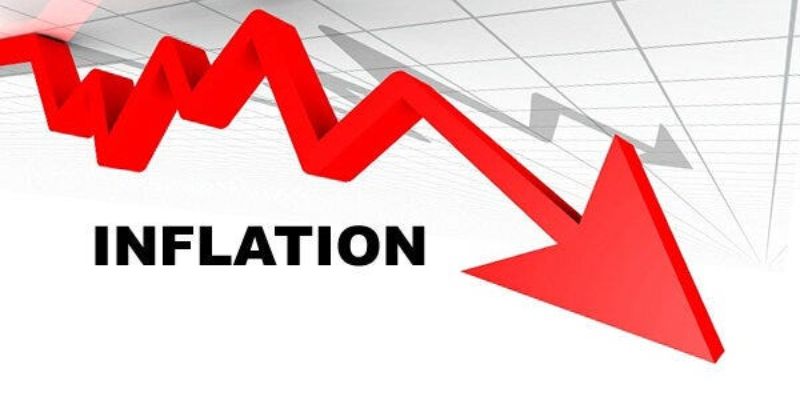Inflation’s Grip: How Sharp Price Surges Shake the Stock Market
Money doesn’t go as far when prices jump up. That’s inflation hitting your wallet. But it’s not just about what you can buy. Inflation’s tight grip reaches far, touching even the vast stock market. When costs rise, the market listens—and reacts. My journey through trading and studying the patterns teaches me one thing clearly: the impact of inflation on the stock market is a beast we can’t ignore. Join me as I break down how this silent player moves the pieces on the financial board, making or breaking fortunes with its whims. Let’s dive deep into what inflation means for your stocks, and how you can stay afloat in this riptide of rising prices.
Unpacking Inflation: Equities in the Hot Seat
Dissecting Inflationary Pressures on Equities
When prices jump, it can hurt how much your money buys. Think of it like this: last year, one dollar could buy a whole loaf of bread, but this year, it may only get you half a loaf. That’s inflation at work, and it shakes up the stock market too.
As prices climb, companies face higher costs for making goods and selling services. They may have to charge more to make the same profit. This can scare off customers and make investors worry. In turn, these worries can lead to drops in stock prices.
When we talk about inflationary pressures on equities, we’re looking at how these rising costs make things tough for stocks. Companies that can’t keep up may see their stock prices fall. But those that handle these costs well can still do alright. Also, some types of stocks, like those that give dividends or are in strong sectors like energy or tech, can even benefit when prices rise.
Historical Analysis: Inflation Impact on Stock Returns
Looking back helps us see patterns. We can learn a lot from how stocks have done during past times of high inflation. For example, in the 1970s, inflation was high, and stock market performance was not so good. But not all stocks did poorly.
It’s not just about high prices; it’s also about how fast they’re going up. If inflation spikes quickly, it can shake the stock market hard. People get worried and might sell their stocks. But when inflation rises slowly, stocks can adjust better. Investors have more time to pick the right moves to make.
Why does inflation hit some stocks harder than others? It’s about how much power each company has to pass on higher costs to their customers. Companies with strong brands or unique products can often do this well. On the other hand, companies that compete just on price might struggle more.
In times of rising inflation, investors often look for stocks that are seen as safer. These are the defensive stocks. Think health care or utilities where demand stays steady even when prices go up. Growth stocks, like tech companies that are expected to expand a lot, can be riskier when prices jump. But if they have big advantages in their industry, they can still shine. Value stocks, which are shares of companies priced lower than how they perform, can also be smart picks.
When we talk about inflation impact on stock returns, it’s all about the long game. Stocks might dip with rising prices, but they can bounce back. Keeping a mix of different kinds of investments can help protect your money over time.
Staying sharp about the connection between inflation and stocks is key. The more you know about how they dance together, the better you can tune your investment moves. Smart investing means looking out for these changes and knowing how to ride the waves when prices rise.

Inflation’s Varied Effects on Investment Strategies
Crafting Inflation-Proof Investment Strategies
We all want our money to grow, no matter what the economy does. But when prices leap up and bite, we call it inflation, and it can hurt our investments. Having a plan that stands strong when inflation hits is like wearing armor in battle. It keeps your money safe. So how do we build this armor?
First, know that inflation means things cost more, and your dollars buy less. You need investments that grow faster than prices do. It sounds tough, but it’s not impossible. Let’s dive in and learn how we can keep our money growing, even when inflation tries to hold it back.
Identifying Resilient Asset Classes: Inflation Hedge Investments
Some investments are like superheroes when it comes to fighting inflation. We call these “inflation hedge investments.” They can take a punch from rising prices and not fall down. Let’s look at what they are.
Imagine a seesaw. On one side, you’ve got inflation going up. You want something on the other side to balance it out. Stocks can be great for this. Especially certain kinds like “defensive stocks.” These are like the tough guys in the stock market. They sell things we always need, like food and power. So, they tend to keep making money, even when prices go wild.
“Value stocks” are another ally against inflation. They’re like hidden treasures that cost less than they’re worth. As inflation climbs, they often catch up and their price can jump up too. And then, there are “growth stocks”—the young and fast movers. They might swing up and down, but over time, they can grow a lot. This can beat inflation if you’re patient.
But it’s not just about stocks. Don’t put all your eggs in one basket. Have different kinds of investments. Bonds, for example, might slow down when inflation is high. But some are made to keep up with inflation. Look for these special bonds. And don’t forget about real things, like land or gold. They often keep their value, even when money does not.
Think about how fast trees in a forest grow. Some years, they shoot up. Other times, they grow slow. Like trees, your investments will grow at different speeds during inflation. The key is to have a mix, so at least some are always growing.
Remember, when inflation creeps in, it’s time to check your investment mix. Make sure you have those tough stocks, and other things that do well when prices climb. Keep an eye on how fast prices are rising by watching the Consumer Price Index. It’s like a speedometer for inflation.
Yes, inflation can be scary, but it’s not unbeatable. With the right mix of investments that move faster than inflation, your money can still grow strong. It’s about being smart and ready. And now you know more about creating a battle plan that helps your money fight back against inflation’s squeeze.

Reading the Inflation Gauge: CPI and Market Movements
Consumer Price Index Effect on Stocks
Let’s dig into how inflation messes with stocks. Inflation means prices go up. When prices climb, people can buy less with their cash. This is called losing purchasing power. Now, there’s this thing called the Consumer Price Index, or CPI. It’s like a money thermometer. It measures how much prices rise over time. The CPI rising fast scares folks. They worry their money won’t stretch as far.
When the CPI jumps, people act. Some may sell stocks. They fear costs will eat up company profits. If a lot of people sell, stock prices can dip. This is how inflation affects stock prices.
But it’s not all bad. Some stocks actually do okay when prices rise. Say hello to inflation hedge investments. These are things you can put money into that don’t lose value fast when prices hike. Stocks of companies that can pass higher costs to customers can be good hedges.
Inflation can make markets wobble a lot, too. This bumpy ride is called inflation-induced stock volatility. Stocks bounce up and down more than usual. This can happen because the CPI news makes people worry and trade more. Remember, as the CPI ticks up, so can nerves on Wall Street.
Investing during inflation is tricky. You need strategies to handle rising costs. But inflation also means interest rates usually go up. This is because the folks in charge of money, like the Fed, hike rates to cool things down. Higher interest rates can make loans cost more. This can slow spending and investing, which often hits stock prices.
Sector Performance Under Inflationary Spotlight
Now, let’s peek at different business types, or sectors, and how they handle hot inflation. All sectors don’t react the same way to rising prices. Some sectors, like basic needs — think food, power, and water — often weather the inflation storm better. This makes sense because people always need these things, even if prices go sky-high.
There are also tech and health stocks. They can be a mixed bag in inflation times. Tech companies might struggle if their stuff costs more to make. But if they sell things we can’t do without, they might hold up fine.
Real estate can be an interesting play. When inflation zooms, so can rent. So, companies that own a lot of property might see more cash flow in. But watch out! If interest rates soar, folks might not buy as much property. That can hurt real estate stocks.
Understanding sector performance in inflationary environments takes patience. You want to think about how each sector fits into the big picture.
Inflation and how it hooks into the stock market is a big puzzle. But knowing about the CPI and which sectors shine during inflation can help you face the challenge. Always keep an eye on the big picture and don’t get rattled by the daily noise. Inflation’s like weather for money. Sometimes it’s stormy, sometimes it’s calm. Either way, you gotta dress right for it. That’s why smart investing during these times is key.

Navigating the Rough Waters: Stock Classes and Inflation Dynamics
Evaluating Defensive, Growth, and Value Stocks During Inflation
When prices rise fast, people worry about money. This worry hits the stock market too. Different stocks act like ships in a storm during these times. Some can ride the waves. Others sink.
Defensive stocks can float well when times get tough. They’re like big ships with strong hulls. Companies that sell things we always need, like food and medicine, don’t dip much. People buy these even when money feels tight.
Growth stocks, though, can have it rough. These are the speedy boats. When the sea is calm, they race ahead. But in inflation times, when costs soar, they may slow down. Fewer people spend on fancy gadgets and extra services. So these stocks can drop.
Value stocks are like smart captains who know the sea’s tricks. They may not shine brightest in calm seas. But in rough waters, their low price can draw more eyes. They can help spread out the risk in your stock mix.
Central Bank Policies and their Market Reverberations
The central bank is like the lighthouse for ships. It sends out signals that help them find their way. When the central bank cuts rates, it’s like a clear night. Stocks usually go up because borrowing money gets cheaper.
When rates rise, it’s like a storm is coming. Money costs more, and that can slow down the business. But banks do this to keep prices from rising too much. It’s tricky. They have to do enough to calm the waves but not too much to cause a crash.
Stocks can get hit when the bank’s moves surprise people. No one likes a storm that comes out of nowhere. So investors always keep an eye on the lighthouse. They want to know which way the wind will blow next.
Money stories can be tough. But like the wise sea captains, we can learn. We keep our ships ready for any weather. By understanding, we can sail through inflation’s grip on the market. And with care, we can reach safe harbor.
Understanding the dance of stock types and central bank moves helps us steer clear. It gives us the map to find treasures, even when inflation tries to hide them.
We explored how inflation touches our investments, especially stocks. We dug into how prices going up can shake up the stock market. We looked at history to see how stocks did when costs soared.
We also talked about building investment plans that can stand up to inflation. We learned about different kinds of assets that can help protect our money.
We checked out the Consumer Price Index, or CPI. We saw how it can signal changes in the market. We talked about how different business areas get hit by inflation.
Then, we dove into how various stock types ride out inflation. We discussed how central banks try to manage inflation and the big waves their choices can make in the stock market.
Here’s the takeaway: knowing how inflation works can guide us to smarter choices with our money. We can pick assets that are tough against inflation. It’s all about staying steady when financial storms hit. Keep these tips in mind, and let’s aim to make our investments inflation-tough!
Q&A :
How does inflation affect the stock market?
Inflation can have a multifaceted impact on the stock market. Typically, as inflation rises, the value of currency goes down, which can erode purchasing power. Companies may face higher costs for raw materials and labor, possibly leading to lower profit margins and earnings. Consequently, investors may find stocks less attractive, causing stock prices to decline. However, some sectors, like commodities, can benefit from inflation, as prices for goods rise.
What are the long-term effects of inflation on stocks?
Over the long term, inflation can be both a hindrance and a catalyst for stocks. Historically, moderate inflation is associated with economic growth, which can be good for stocks. However, high inflation rates over an extended period can lead to increased interest rates by central banks to curb spending, which can slow economic growth, potentially leading to a bearish stock market. Some stocks that are tied to assets like real estate or commodities can act as a hedge against inflation in the long run.
Can stock markets predict inflation trends?
Stock markets are often seen as forward-looking indicators and can sometimes signal expectations about future inflation. If investors anticipate that inflation will rise, this could be reflected in the performance of certain stocks or sectors. For instance, rising prices in commodity-based stocks may suggest expectations of higher inflation. However, predicting inflation involves considering various other economic indicators, and stock markets do not always predict inflation accurately.
What strategies can investors use to protect their stock portfolio against inflation?
Investors may employ numerous strategies to shield their stock portfolio from the effects of inflation. This can include diversifying into sectors less sensitive to inflation, such as technology or healthcare, or those that traditionally benefit from inflation, like basic materials or energy. Investing in Treasury Inflation-Protected Securities (TIPS) or stocks with strong pricing power that can pass increased costs to consumers is also a common approach.
How do central bank policies during inflationary periods affect the stock market?
During periods of high inflation, central banks often implement policies such as raising interest rates to stabilize the currency and control excess spending. While these measures can help manage inflation, they can also result in increased borrowing costs for businesses and consumers, which can dampen corporate profits and reduce consumer spending. This, in turn, can lead to declines in stock prices. However, if investors believe the policies are effective, it could improve confidence and thus be beneficial for the stock market in the longer term.

